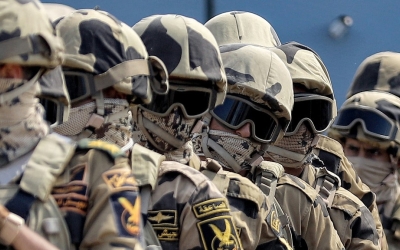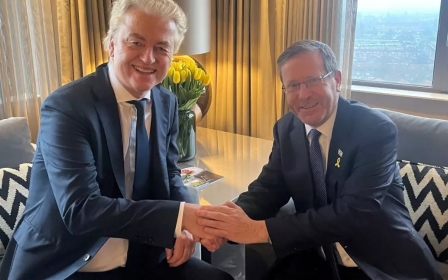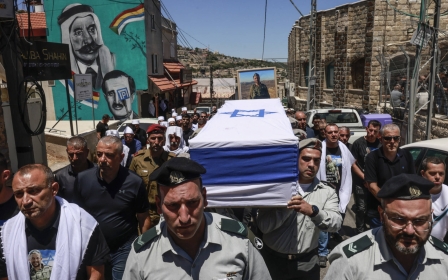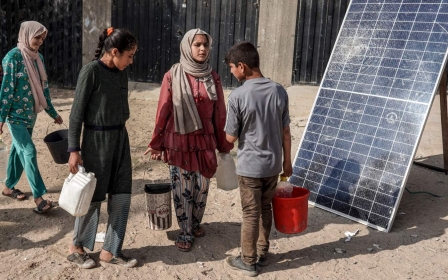War on Gaza: 'Brutal day' as Israel bombs tents, refugee camps and service workers
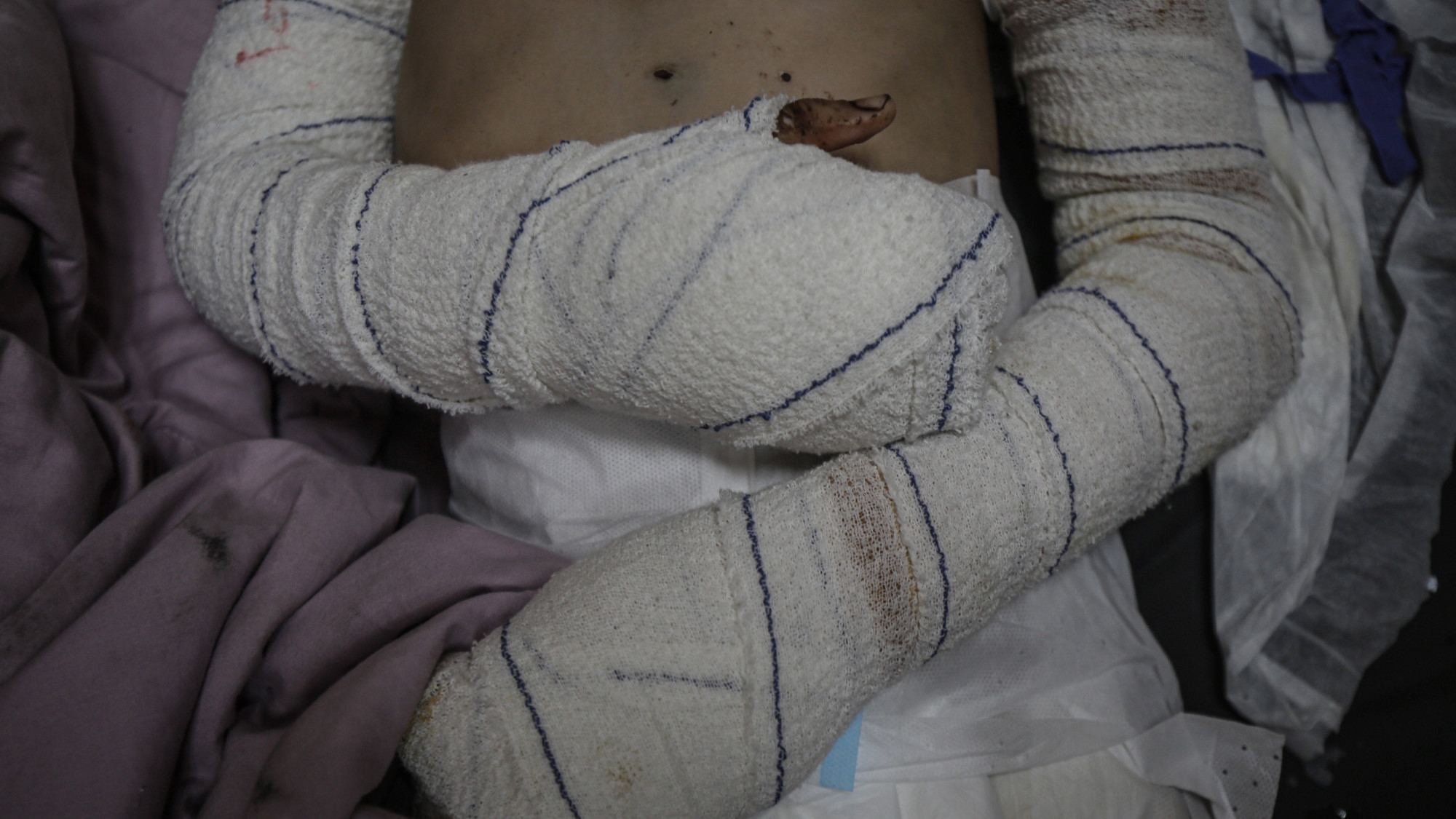
Israeli forces bombed displacement tents, municipal workers operating water wells and homes across Gaza on Friday, killing over 75 people according to Al Jazeera Arabic, on one of the deadliest days for Palestinians in weeks.
Artillery shelling and gunfire from Israeli tanks targeted displaced people sheltering in Rafah's coastal al-Mawasi area, previously declared a “humanitarian zone” by the Israeli military.
At least 25 Palestinians were killed in the attack and 50 wounded, the Palestinian Ministry of Health said.
Hours earlier, an Israeli strike hit a municipality facility in Gaza, killing at least seven people, including five workers operating water wells.
Another strike on a home in the densely populated and war-ravaged al-Shati refugee camp killed 10 people and wounded 17, according to Al Jazeera.
New MEE newsletter: Jerusalem Dispatch
Sign up to get the latest insights and analysis on Israel-Palestine, alongside Turkey Unpacked and other MEE newsletters
Additional deadly strikes were reported in Gaza's old city, Zeitoun neighbourhood and the Nuseirat refugee camp.
At least 30 people were killed all across Gaza, according to Dr Fadel Naeem, the director of al-Ahli hospital, which has been minimally operational due to repeated Israeli attacks in recent months.
It has been a "difficult and brutal day" in the city, said Dr Naeem.
The strikes coincided with an intensification of Israeli ground attacks in almost all areas of Rafah in southern Gaza.
This included advances towards the population centres in the city's west and north.
US President Joe Biden previously stated that Israeli attacks on Rafah's population centres would end Washington's support for Israel's war.
The escalation of the Rafah ground invasion has led to fierce fighting in recent days, with explosions and gunfire regularly heard in the distance.
This has also triggered another wave of displacement for Palestinians, including those sheltering in Israeli-designated “humanitarian zones”, as tanks draw closer each day.
Meanwhile, Israeli forces shot dead two Palestinians inside their car in the occupied West Bank city of Qalqilya, in what residents described as a targeted killing.
Israeli forces said the two were members of the Palestinian Islamic Jihad, resisted arrest and opened fire first. The Israeli military said it was "looking into" the attacks on al-Mawasi and a separate incident in Gaza, according to Reuters.
Unchanged aid impediments
The humanitarian crisis in Gaza, caused by Israel's bombardment and siege, is likely to worsen due to scorching heat, the World Health Organisation (WHO) warned on Friday.
"We've seen massive displacement over the last weeks and months, and we know that combination and the heat can cause a rise in diseases," said Richard Peeperkorn of the WHO.
"We have water contamination because of hot water, and we will have much more food spoilage because of the high temperature. We will get insect mosquitoes and flies, dehydration, heat stroke."
Peeperkorn added that the daily “pauses” announced by the Israeli military over the weekend have not impacted impeded aid deliveries.
The WHO has called for the reopening of the Rafah crossing, seized by Israel in early May and subsequently destroyed, to facilitate aid and medical evacuations for 10,000 wounded people needing treatment abroad.
As the civilian death toll and humanitarian conditions, particularly the growing hunger crisis in northern Gaza, continued to worsen, Israeli Prime Minister Benjamin Netanyahu denied deliberately targeting civilians or imposing a starvation policy.
In an interview with conservative US outlet Punchbowl News, Netanyahu labelled the accusations as “blood libel against the Jewish people”.
“These are two of these slanders that are levelled at the Jewish state, much as they said that we are killing Christian children to bake Matzos in the Middle Ages or that we're spreading vermin to poison the entire populations,” he said.
Human rights groups and UN experts have accused Israel of collective punishment against Palestinians since the Hamas-led attack on 7 October, including the use of starvation as a weapon of war.
Last week, UN investigators concluded that Israel is guilty of committing the crime of "extermination" in Gaza, alongside acts of sexual violence, torture, and the use of starvation as a weapon of war, among other war crimes and crimes against humanity.
'Sustained demilitarisation'
On the future of the war, Netanyahu said there would be a “sustained demilitarisation” of the Gaza Strip, a task that only Israel can undertake.
Civil administration would involve “cooperation of inter-Arab sponsorship and assistance by Arab countries”, he added.
The reconstruction of Gaza, more than half of which has been destroyed or damaged by Israeli air strikes, would largely be managed by the international community.
His comments come amid growing tensions between him and the military over the need for a political solution to end the fighting in Gaza.
The wait also continues for Israel to respond to Hamas's latest ceasefire counter-proposal, submitted to mediators a week ago.
Qatari Prime Minister Mohammed bin Abdulrahman bin Jassim Al Thani said on Friday that there had been some “progress to an extent” in negotiations, but gaps remain.
"We continue our endeavours and there have been successive meetings with the Hamas movement in a bid to bridge the gap between the two sides and reach an agreement to achieve ceasefire and exchange hostages and prisoners," he said in Madrid, where he was participating in the Qatari-Spanish Strategic Dialogue.
Meanwhile, fears continue to mount over the possibility of an all-out war between Israel and Lebanon's Hezbollah.
"One rash move - one miscalculation - could trigger a catastrophe that goes far beyond the border, and frankly, beyond imagination," United Nations Secretary-General Antonio Guterres told reporters.
"Let's be clear: the people of the region and the people of the world cannot afford Lebanon to become another Gaza."
Middle East Eye delivers independent and unrivalled coverage and analysis of the Middle East, North Africa and beyond. To learn more about republishing this content and the associated fees, please fill out this form. More about MEE can be found here.



